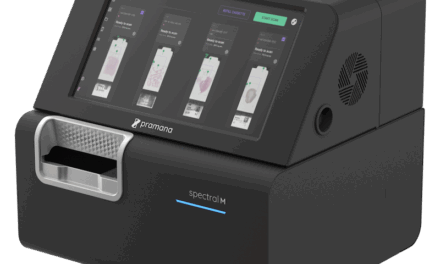Massachusetts General Hospital (MGH) and Brigham and Women’s Hospital (BWH), both members of the Partners health network, will implement the Philips IntelliSite pathology solutionfrom Royal Philips, Amsterdam, the Netherlands, to enable research and support clinical diagnosis.
MGH and BWH aim to deploy digital pathology infrastructures to enable digital pathology research, education, and collaboration, and to help shape and inform the deployment of digital pathology across the country by establishing best practices and protocols.
The framework of the collaboration will include establishment of digital pathology centers, each defined and structured around common underlying themes that span the entire digital pathology space, including user interface design, analytics, education, and the economics of digital pathology. Specific skills and resources will be assembled to promote effective execution of projects in these different areas, and will include collaboration among Partners personnel and Philips engineers and scientists.
“Bringing together two large academic institutions that share the goal of investing in pathology’s future marks a turning point in digital pathology in the United States,” says Jeff Golden, MD, chair of pathology at Brigham and Women’s Hospital. “There is tremendous opportunity not only to improve lab efficiency through increased access to information and images that eliminates the chance of materials being lost, broken, or misfiled, but also to dramatically enhance patient care through the deployment of advanced algorithms.”
Digital pathology is a novel approach to diagnosis that incorporates digital images of tissue into the pathology workflow rather than visual examination of the slide by a microscope. Gaining momentum in recent years, digital pathology features a highly automated workflow that enables pathologists to compile clinically actionable information in a timely manner and facilitates the sharing of images for enhanced collaboration.
Marketedfor primary diagnostic usein the United States, the Philips IntelliSite pathology solution assists pathologists in managing, scanning, storing, presenting, reviewing, and sharing information across labs and lab networks. Philips’ agreement with MGH and BWH includes leveraging the Philips IntelliSite pathology solution to empower greater collaboration among pathologists and access to expert opinions on patient cases, and the development of teaching and training sets to educate pathologists around the globe about the technologies and processes involved in digital pathology.
“Leading the digital transformation in anatomic pathology is key to evolving the field to better meet the needs of patients and pathologists” says David Louis, MD, pathologist in chief at Massachusetts General Hospital. “Determining how to integrate intelligent technology into workflows is a first step to change how pathologists work on a day-to-day basis and to allow for the introduction and development of artificial intelligence in diagnostic anatomic pathology.”
“Digital pathology helps labs and health systems improve the speed and quality of diagnoses through streamlining workflows and enhancing connection to expert opinions around the world to complement a pathologist’s individual expertise,” says Marlon Thompson, general manager of Philips digital pathology solutions. “Partnering with MGH and BWH will help expand the adoption of digital pathology and allow more institutions to collaborate and see the true benefits of automated technology in pathology.”
For more information, visit Royal Philips.







